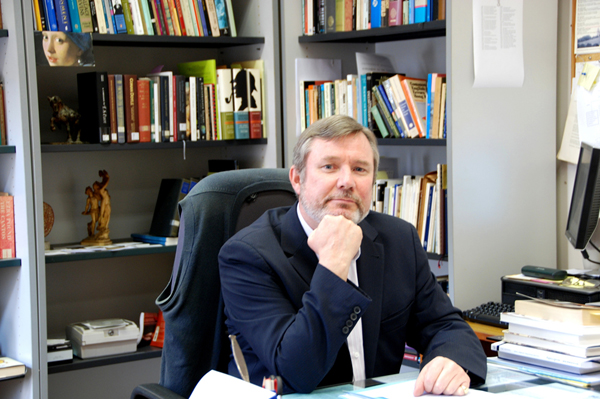God Save the Dean
By Douglas Kerr
Douglas Kerr, Professor of English, was appointed Dean of the Faculty of Arts upon the departure of Professor Kam Louie at the end of 2013

~
I started work in the Arts Faculty office at the beginning of January, having been asked to bridge the gap between the departure of Kam Louie and the arrival of a successor. This gap will probably be of one to two years. Despite many years of service, including a spell as a Department Head and twice as Associate Dean, I wasn’t really sure what was involved in the job of the Deanship. After four months in the job, I think I’m beginning to understand.
It is sometimes observed that the captain of a ship is the only crew member who doesn’t appear to do any work. He doesn’t steer the ship, toil in the engine room, or scrub the decks. He’s just there. His main function is to take responsibility for what happens. It’s somewhat similar with the Dean of a Faculty. Heads run the different Schools. Associate Deans look after research, teaching, admissions and so on. The Faculty Secretary oversees the administration. What is left for the Dean to do, apart from making a speech from time to time, and signing some forms?
If there doesn’t seem to be much for the Dean to do, it certainly takes a lot of time to do it. The Deanship is a full-time job (though actually I have still been teaching this semester: research time has more or less disappeared). The Dean reports to the Vice-Chancellor, makes policy, manages the budget, hires and fires, and is answerable to the “stakeholders”—students, professoriate, administrators, alumni, and ultimately the public—for the doings of the Faculty. Arts at HKU is a multi-million-dollar business, producing education and research to the highest possible standard—we are consistently judged the best Arts Faculty in Asia. We have thousands of undergraduate and postgraduate students, over 200 full-time teaching faculty, and about 100 part-time and non-academic staff. Over 90 administrative, executive and office staff support the academics and their students.
There is a natural mutual suspicion between academics and managers in any university. Academics like to think of themselves as free spirits, and to think of managers as anal-retentive spoilers, intent on squashing the round peg of intellectual creativity into the square hole of fixed protocols and procedures. Managers on the other hand think of themselves as realists and problem-solvers. They suspect academics of being impractical and obtuse, every one convinced he or she is a special case to whom ordinary rules can’t possibly apply. My experience as an academic Dean sometimes leads me to think that both sides are right. HKU is, I think, over-managed and too centralised. On the other hand, some academics have almost no idea about the institutional structures that make their work possible and, in the end, pay their salaries.
Well, I have enjoyed the job so far, but I’m not in it for the long run. When a new Dean has been appointed and takes up office, I will be happy to return to civilian life in the School of English. I intend to go quietly. After all, my rise to the heights of Deanly power had less in common with Shakespeare’s ambitious Richard III, who murdered everyone in his path to the throne, than with the Roman emperor Claudius, who was proclaimed monarch by the Praetorian Guard after they had discovered him in a corner of the imperial palace, hiding behind a curtain.

Our apologies, you must be logged in to post a comment.